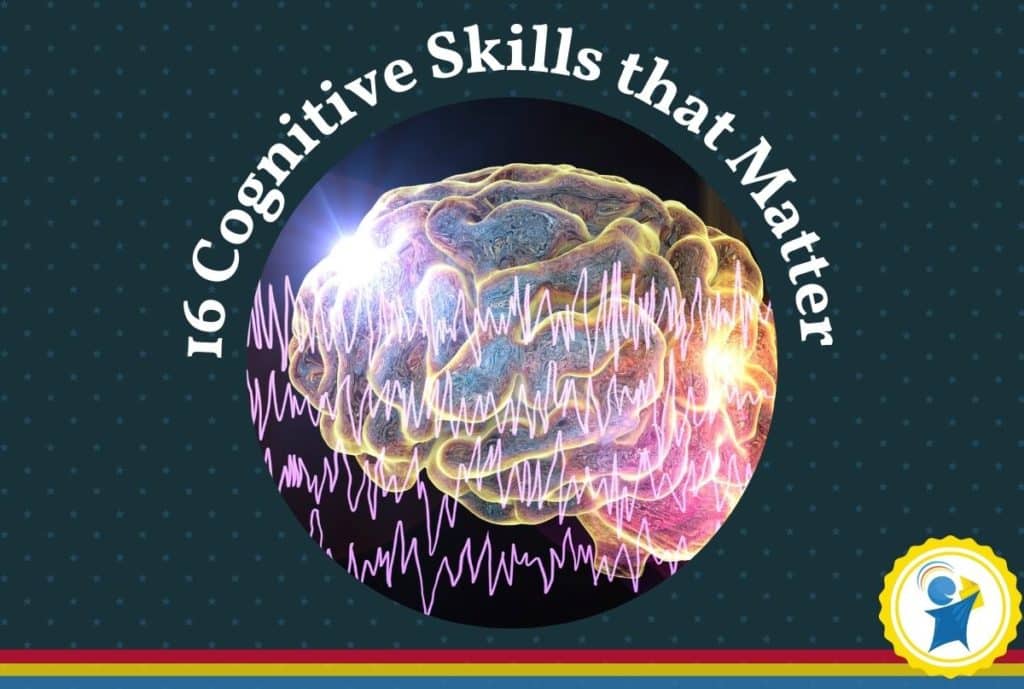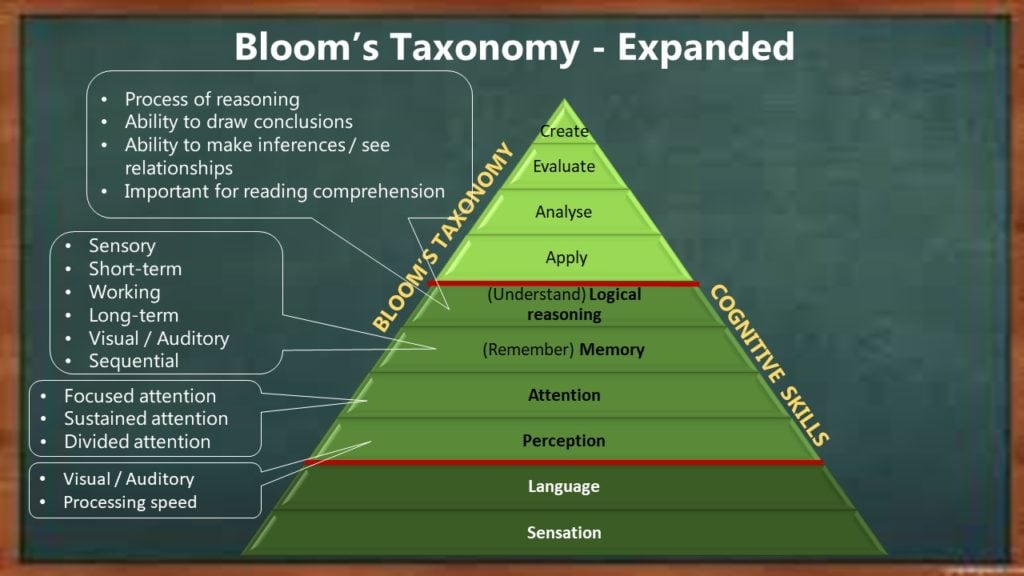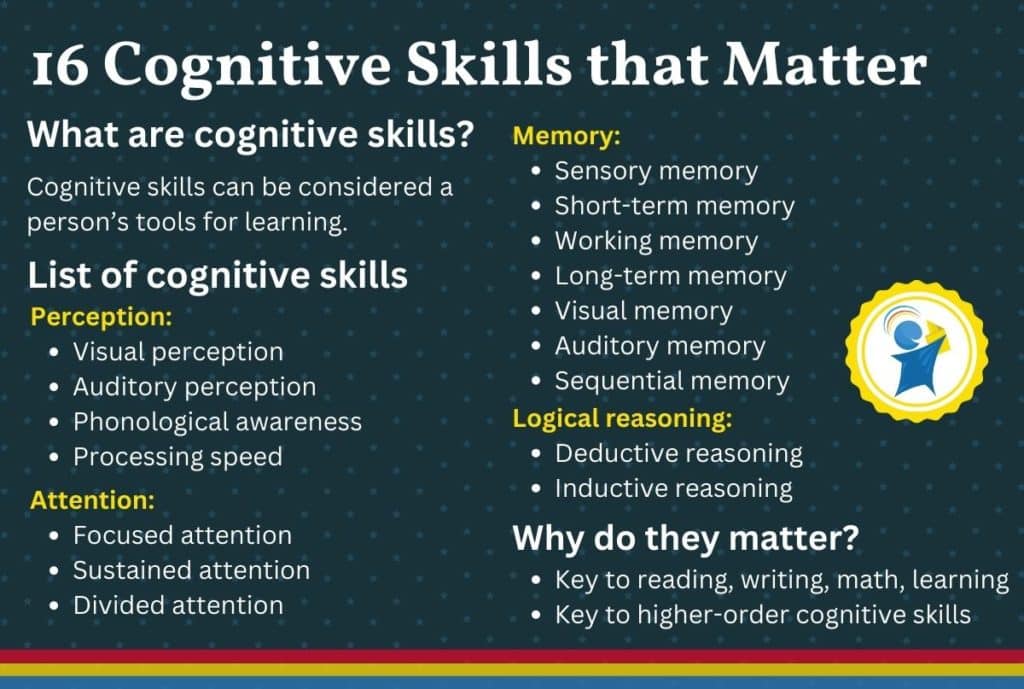
Cognitive skills are mental skills used in acquiring knowledge, manipulating information, reasoning, and problem-solving. Synonyms are cognitive abilities, cognitive functions, or cognitive capabilities.
Cognitive skills can be considered a person’s tools for learning. With the right tools, one can complete tasks with ease and efficiency. Imagine, for example, trying to mix cement with a spoon rather than a cement mixer. Imagine trying to mow the lawn with a pair of scissors!
One of the most common complaints among educators is that their students lack the cognitive or brain-based abilities to handle a curriculum. Although this is anecdotal at best, teaching cognitive skills is overlooked at all levels of education.
Table of contents:
List of core cognitive skills
The word “core” refers to the central, innermost, or most essential part of anything. Therefore, core cognitive skills (hereafter referred to as cognitive skills) are essential brain-based skills without which learning will most likely fail. Cognitive skills include perception, attention, memory, and logical reasoning:
– Perception
Sensation is the pickup of information by our sensory receptors, for example, the eyes, ears, skin, nostrils, and tongue. In vision, sensation occurs as rays of light are collected by the eye and focused on the retina. In hearing, sensation occurs as waves of pulsating air are collected by the outer ear and transmitted through the bones of the middle ear to the cochlear nerve.
On the other hand, perception — also called processing — is interpreting what is sensed. For example, the physical events transmitted to the retina may be interpreted as a particular color, pattern, or shape. Likewise, the physical events picked up by the ear may be interpreted as musical sounds, a human voice, noise, and so forth. In essence, then, perception means interpretation.
- Visual perception is the cognitive component of interpreting visual stimuli. Simpler said, visual perception is what the brain does with what the eye sees.
- Auditory perception is the ability to identify, interpret, and attach meaning to sound; it is what the brain does with what the ears hear.
- Phonological awareness, the ability to hear the individual sounds (phonemes) in words, is at the heart of reading and requires a range of auditory processing skills. Auditory synthesis and auditory analysis, for example, are two processing skills necessary for segmenting and blending sounds.
- Processing speed involves one or more of the following functions: the length of time it takes to perceive information, process information, and formulate or enact a response. Another way to define processing speed is to say that it’s the time required to perform an intellectual task or the amount of work that can be completed within a certain period. Even simpler, one can define processing speed as how long it takes to get stuff done.
A lack of experience may cause a person to misinterpret what he has seen or heard. In other words, perception represents our apprehension of a present situation in terms of our past experiences, or, as stated by the philosopher Immanuel Kant in his book Critique of Pure Reason (1781): “We see things not as they are but as we are.”
.
– Attention

The process of perception is very much affected by attention, a phenomenon that involves filtering incoming stimuli. Human beings do not pay attention to everything in their environments, nor do they attend to all the stimuli impinging on their sense organs. Rather than becoming overwhelmed by the enormous complexity of the physical world, we attend to some stimuli and do not notice others.
William James (1842-1910) recognized the importance of attention very early. “A thing may be present to a man a hundred times, but if he persistently fails to notice it, it cannot be said to enter his experience,” he wrote in his book Psychology: The Briefer Course.
We can split attention into focused, sustained, and divided attention:
- Focused attention refers to paying attention to the most important things in your environment while screening out distractions.
- Sustained attention enables us to stay focused for a sustained period.
- Divided attention requires one to perform two (or more) tasks simultaneously, and one needs attention for both (or all)..
– Memory
Memory is how knowledge is encoded, stored, and later retrieved. Although the word memory may conjure up an image of a singular, “all-or-none” process, it is clear that there are many kinds of memory, each of which may be somewhat independent of the others.
Based on the length of time the memory is stored, there are four main categories:
- Sensory memory is the shortest-term element of memory. It is the ability to retain impressions of sensory information after the original stimuli have ended. It acts as a kind of buffer for stimuli received through the five senses of sight, hearing, smell, taste, and touch, which are retained accurately but very briefly. For example, the ability to look at something and remember what it looked like with just a second of observation is an example of sensory memory. The sensory recall of visual stimuli is sometimes known as iconic memory, the recall of aural stimuli as echoic memory, and that of touch as haptic memory.
- Short-term memory is the part of the brain’s memory system that holds information the individual is consciously thinking about at the moment. Its capacity appears limited to about seven items; unless the information is rehearsed, it will be lost in about 30 seconds.

- Working memory is the ability to hold information in your head and manipulate it mentally. One can compare it to the control tower of a major airport, which is responsible for scheduling and coordinating all incoming and outgoing flights. You need this memory type to retain ideas and thoughts as you work on problems. In writing a letter, for example, you must be able to keep the last sentence in mind as you compose the next. Likewise, to solve an arithmetic problem such as (3 X 3) + (4 X 2) in your head, you need to keep the intermediate results in mind (i.e., 3 X 3 = 9) to be able to solve the entire problem.
- Long-term memory is the relatively permanent storage system that holds information indefinitely. In it, we store last year’s football scores, the image of an elephant, and how to ride a bicycle. We also appear to be storing information that we can’t consciously retrieve but still affects our behavior.
When it comes to memory, one’s senses are involved too.
- Visual memory involves the brain’s ability to store and retrieve previously experienced visual sensations and perceptions when the original stimuli are no longer present. Various researchers have stated that as much as 80 percent of all learning occurs through the eye, with visual memory being a crucial aspect.
- Auditory memory involves taking in information that is presented orally, processing that information, storing it in one’s mind, and then recalling what one has heard. Basically, it involves the skills of attending, listening, processing, storing, and recalling.
- Sequential memory requires one to recall items in a specific order. For example, the order of the elements is paramount in counting and saying the days of the week, months of the year, a telephone number, and the alphabet. Visual sequential memory is the ability to remember things seen in sequence, while auditory sequential memory is the ability to remember things heard in order..
– Logical reasoning
Logical reasoning is the process of arriving at a conclusion using a rational, systematic series of steps based on sound mathematical procedures and given statements. In logic, there are two broad methods of concluding: deductive reasoning and inductive reasoning.
- Deductive reasoning begins with a broad truth (the major premise), such as the statement that all men are mortal. This is followed by the minor premise, a more specific statement, such as that Socrates is a man. A conclusion follows: Socrates is mortal. The conclusion cannot be false if both the major and minor premises are true.
- In inductive reasoning, broad conclusions are drawn from specific observations; data leads to conclusions. If the data shows a tangible pattern, it will support a hypothesis. For example, having seen ten white swans, we could use inductive reasoning to conclude that all swans are white.
Of course, this hypothesis is easier to disprove than prove, and premises are not necessarily true, but true given the existing evidence and that one cannot find a situation in which it is not.
Why do cognitive skills matter?
Many studies over many decades have shown that cognitive skills — perception, attention, memory, and logical reasoning — determine an individual’s learning ability; according to Oxfordlearning.com, they are the skills that “separate the good learners from the so-so learners.” In essence, when cognitive skills are strong, learning is fast and easy. Conversely, when cognitive skills are weak, learning becomes a challenge.
Since cognitive abilities are crucial to reading, writing, math, and learning, they are typically impaired in developmental disorders of attention, language, reading, and mathematics, such as ADHD, dyslexia, dyscalculia, and dysgraphia.
– Key to reading, writing, math, and learning
- A study by Cheng et al. (2018) suggests that visual perception deficits commonly underlie developmental dyslexia and dyscalculia.
. - Phonological processing skills play an essential role in the development of reading. For example, Bradley and Bryant (1983) found high correlations between preschool children’s initial rhyme awareness and their reading and spelling development over three years. This link held even after controlling for other variables, such as IQ and memory.
. - Multiple research studies have linked difficulties in processing speed with ADHD and reading disorders. Stenneken et al. (2011) compared a group of high-achieving young adults with dyslexia to a matched group of typical readers. The dyslexic group showed a striking reduction in processing speed (26% compared to controls) while their working memory storage capacity was in the normal range.
.
- Thirty-six 9‐year‐old children took a test of image persistence in visual sensory (iconic) memory and the Neale Analysis of Reading Ability. The reading test gives scores for fluency, accuracy, and comprehension. All three measures of reading performance were significantly related to icon persistence (Riding & Pugh, 1977).
. - Kulp et al. (2002) investigated the relationship between visual memory and academics in 155 second- through fourth-grade children; Optometry and Vision Science published the results. The researchers concluded that poor visual memory ability is significantly related to below-average reading decoding, math, and overall academic achievement as measured by the Stanford Achievement Test.
. - Research has confirmed that auditory recall plays a crucial role in literacy and directly impacts reading, spelling, writing, and math skills. Children with poor auditory memory skills may struggle to recognize sounds and match them to letters – a common symptom of a reading disability or dyslexia. Research by Plaza et al. (2002) found that dyslexic children exhibited a significant deficit in tasks involving auditory memory skills (digit span, unfamiliar word repetition, sentence repetition) compared with their age-mates.
. - Guthrie et al. (1972) investigated relationships between visual sequential recall and reading in 81 typical and 43 disabled readers. The researchers identified significant, positive associations between visual sequential memory and paragraph comprehension, oral reading, and word recognition.
. - Howes et al. (1999) compared 24 readers with auditory dyslexia and 21 with visual dyslexia to 90 control group participants. The researchers revealed auditory sequential memory impairments for both types of readers with dyslexia and multiple strengths for good readers.
. - Working memory is a cornerstone for learning of all kinds, from reading and note-taking to math calculations. Weiss and colleagues (2014) tested 52 musicians, 24 with dyslexia and 28 without dyslexia, and compared two groups’ performances on various auditory tests. On most auditory processing tests, the dyslexic musicians scored as well as their nondyslexic counterparts and even better than the general population. Where they performed much worse was on tests of auditory working memory. The dyslexic musicians with the poorest working memory tended to have the lowest reading accuracy.
. - A study by Bhat (2016) examined the contribution of six components of reasoning ability (inductive reasoning, deductive reasoning, linear reasoning, conditional reasoning, cause-and-effect reasoning, and analogical reasoning) to explain the variation in the academic achievement of 598 class 10th students. The predictive power of various components of reasoning ability for academic achievement was 31.5%. Out of the six dimensions of reasoning ability, the maximum involvement was reflected by deductive reasoning (with a reliability coefficient of .49), followed by cause and effect reasoning (.26), inductive reasoning (.16), linear reasoning (.05), conditional reasoning (.03) and analogical reasoning (.02) on academic achievement..
Each cognitive skill plays a part in processing new information. That means if even one of these skills is weak, no matter what kind of information is coming one’s way, grasping, retaining, or using that information is impacted.
Most learning challenges are the result of weak cognitive skills. But more importantly, our core cognitive abilities are crucial to developing higher-order cognitive functions.
– Key to higher-order cognitive skills
Learning does not take place on a single level but is a stratified process. For example, one has to learn to count before it becomes possible to learn to add and subtract. Suppose one tried to teach a child who had not yet learned to count to add or subtract. That would be impossible, and no amount of effort would ever succeed in teaching the child to add and subtract. This shows that counting is a skill that needs to be mastered before it becomes possible to learn to do calculations. In the same way, core, lower-level cognitive abilities must be acquired first, before it becomes possible to master higher-order brain-based skills.
Higher-order cognitive skills — also called higher-order thinking skills — are complex cognitive skills that go beyond basic observation of facts and memorization. They are what we are talking about when we want our students to be evaluative, creative, and innovative. According to Paul and Elder (2007), much of our thinking — left to itself — is biased, distorted, partial, uninformed, or downright prejudiced. Yet, the quality of our life and what we will produce, make, or build depends precisely on the quality of our thought. Critical thinking is the ability to think in an organized and rational manner to understand connections between ideas and facts. It helps you decide what to believe. In other words, it’s “thinking about thinking” — identifying, analyzing, and then fixing flaws in our thinking. Critical thinking is the foundation of a good education.
Bloom’s taxonomy is an educational model that describes the cognitive processes of learning and developing mastery of subjects. Named after Benjamin Bloom, head of a committee of researchers and educators, this model was developed in the 1950s and 60s. Bloom’s taxonomy and critical thinking go hand in hand. Bloom’s taxonomy takes students through a thought process of analyzing information or knowledge critically. The goal is to encourage higher-order thought in students by building up from lower-level cognitive abilities.
Below is an expanded version of the well-known Bloom’s taxonomy, in which we have included the core cognitive skills:

How can cognitive skills be improved?
Edublox specializes in educational interventions that make children smarter, help them learn and read faster, and do math with ease. Our programs enable learners to overcome reading difficulties and other learning obstacles, assisting them to become life-long learners and empowering them to realize their highest educational goals.
Edublox is grounded in pedagogical research and 30+ years of experience demonstrating that weak underlying cognitive skills account for most learning difficulties. Underlying cognitive skills include perception, attention, memory, and logical reasoning. Specific cognitive exercises can strengthen these weaknesses leading to increased performance in reading, spelling, writing, math, and learning.
- Edublox presented a one-week program in Singapore to 27 students, ages 10 to 12; the control group comprised 25 students. The results of the study showed a significant improvement in focused attention.
. - Results of a research study show that Edublox Online Tutor improves processing speed; the auditory memory of the Edublox group also improved significantly according to the paired samples t-test.
. - A study by Mays (2014) found a significant improvement in visual memory – from 6.2 to 7.5 years following an intensive one-week Edublox program of 22.5 hours. .
Edublox Online Tutor has been optimized for children aged 7 to 13, is suitable for the gifted and less gifted, and can be used at home and school. Our programs are effective in alleviating a variety of symptoms associated with dyslexia, dysgraphia, and dyscalculia. Book a free consultation to discuss you child’s learning needs..
Key takeaways

